Regulatory Policies for Sustainable Shared Economy in City Logistics
VerifiedAdded on 2022/08/15
|14
|3335
|14
Report
AI Summary
This report provides a comprehensive analysis of the sharing economy's impact on city logistics, exploring its effects on urban transport, freight sharing, and consumer behavior. It examines the need for regulatory policies to address issues such as public safety, environmental impacts, and labor market changes. The report highlights the limitations of existing regulatory approaches and offers recommendations for developing sustainable regulatory responses. It emphasizes the importance of considering principles that promote commercial activity, reduce excessive legislation, and encourage a cross-governmental approach to create efficient and adaptable regulatory frameworks. The report aims to guide the development of effective policies that foster innovation and economic growth within the city logistics sector, ensuring a balance between promoting the benefits of the sharing economy and mitigating its potential drawbacks.
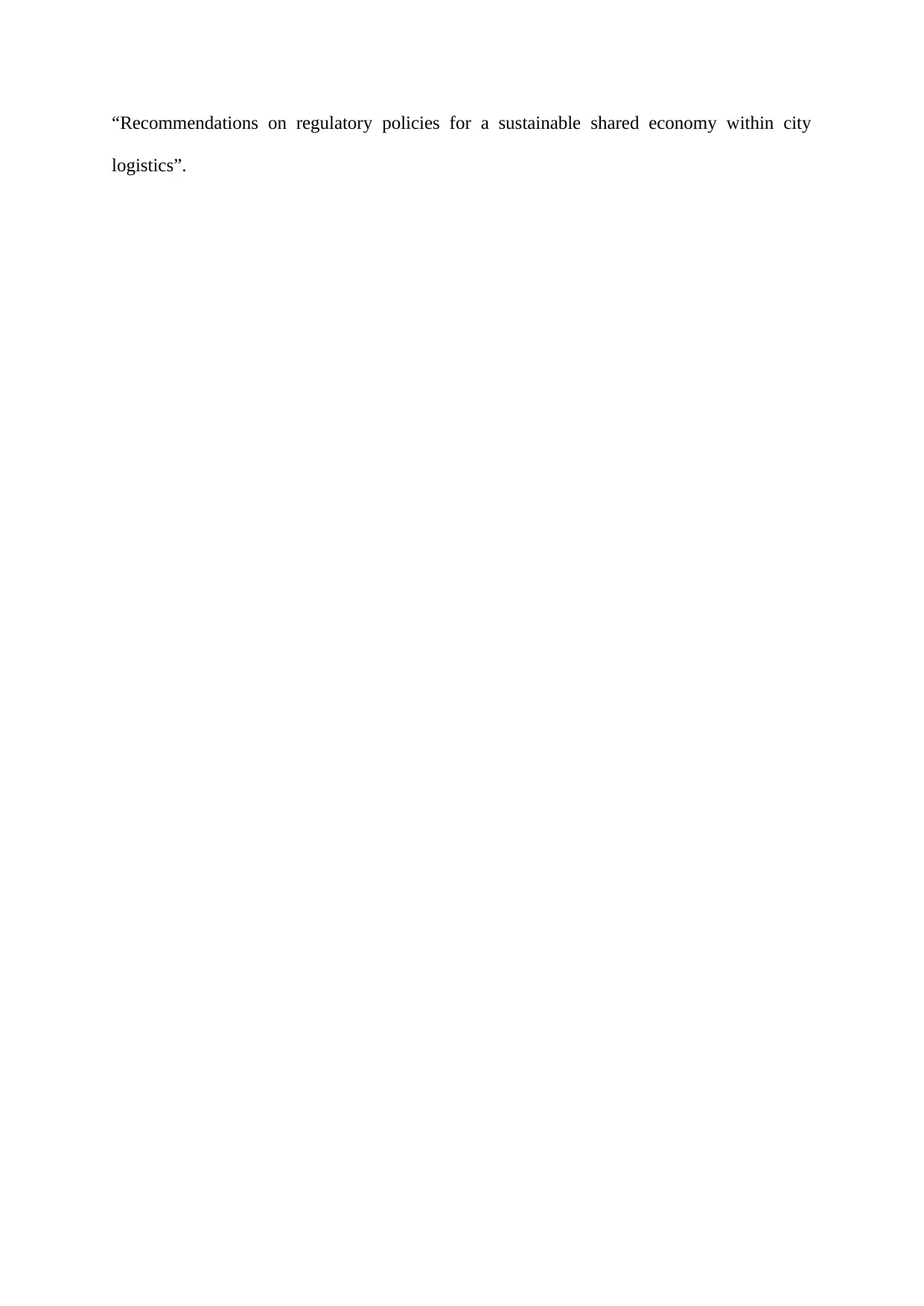
“Recommendations on regulatory policies for a sustainable shared economy within city
logistics”.
logistics”.
Paraphrase This Document
Need a fresh take? Get an instant paraphrase of this document with our AI Paraphraser
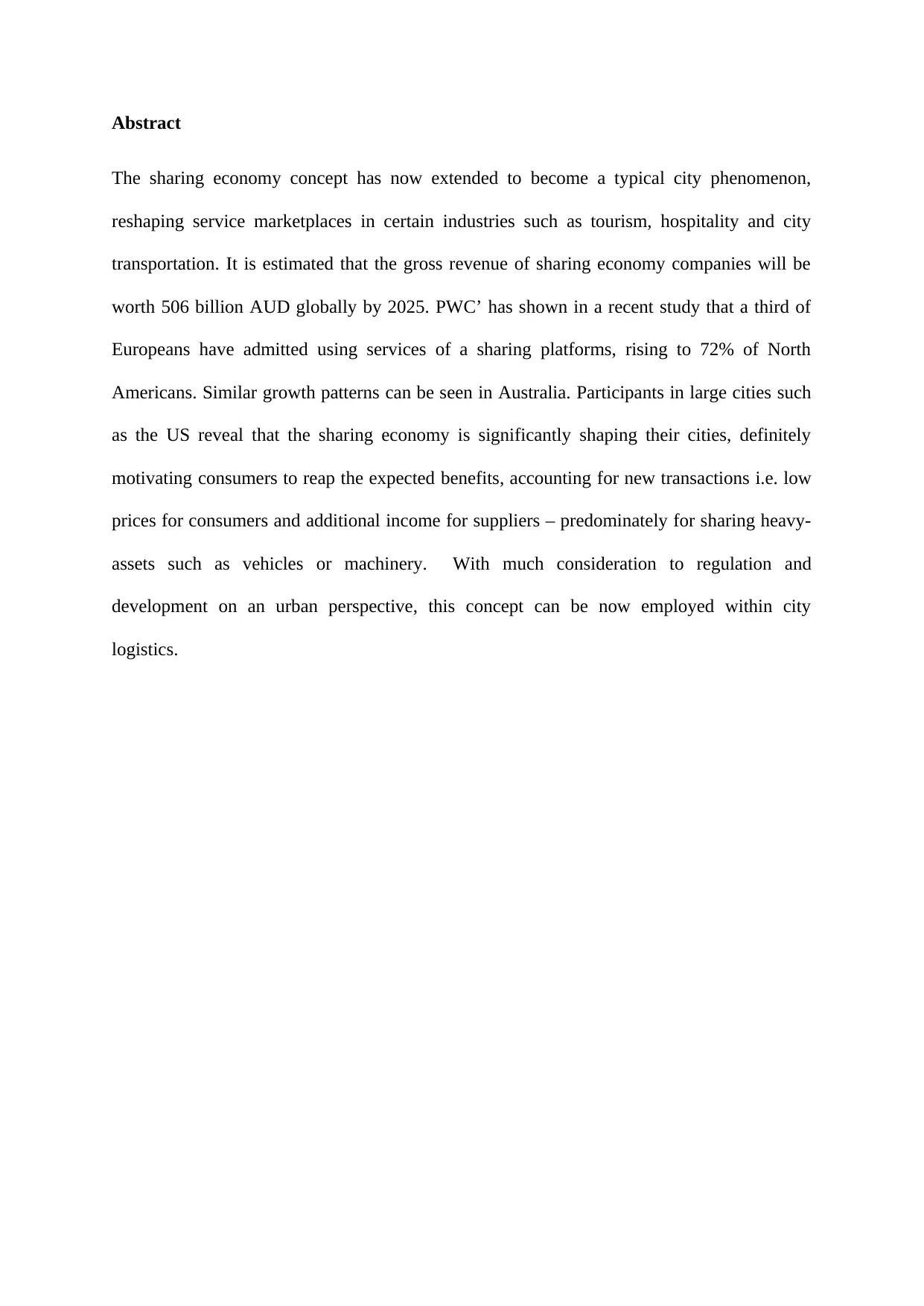
Abstract
The sharing economy concept has now extended to become a typical city phenomenon,
reshaping service marketplaces in certain industries such as tourism, hospitality and city
transportation. It is estimated that the gross revenue of sharing economy companies will be
worth 506 billion AUD globally by 2025. PWC’ has shown in a recent study that a third of
Europeans have admitted using services of a sharing platforms, rising to 72% of North
Americans. Similar growth patterns can be seen in Australia. Participants in large cities such
as the US reveal that the sharing economy is significantly shaping their cities, definitely
motivating consumers to reap the expected benefits, accounting for new transactions i.e. low
prices for consumers and additional income for suppliers – predominately for sharing heavy-
assets such as vehicles or machinery. With much consideration to regulation and
development on an urban perspective, this concept can be now employed within city
logistics.
The sharing economy concept has now extended to become a typical city phenomenon,
reshaping service marketplaces in certain industries such as tourism, hospitality and city
transportation. It is estimated that the gross revenue of sharing economy companies will be
worth 506 billion AUD globally by 2025. PWC’ has shown in a recent study that a third of
Europeans have admitted using services of a sharing platforms, rising to 72% of North
Americans. Similar growth patterns can be seen in Australia. Participants in large cities such
as the US reveal that the sharing economy is significantly shaping their cities, definitely
motivating consumers to reap the expected benefits, accounting for new transactions i.e. low
prices for consumers and additional income for suppliers – predominately for sharing heavy-
assets such as vehicles or machinery. With much consideration to regulation and
development on an urban perspective, this concept can be now employed within city
logistics.
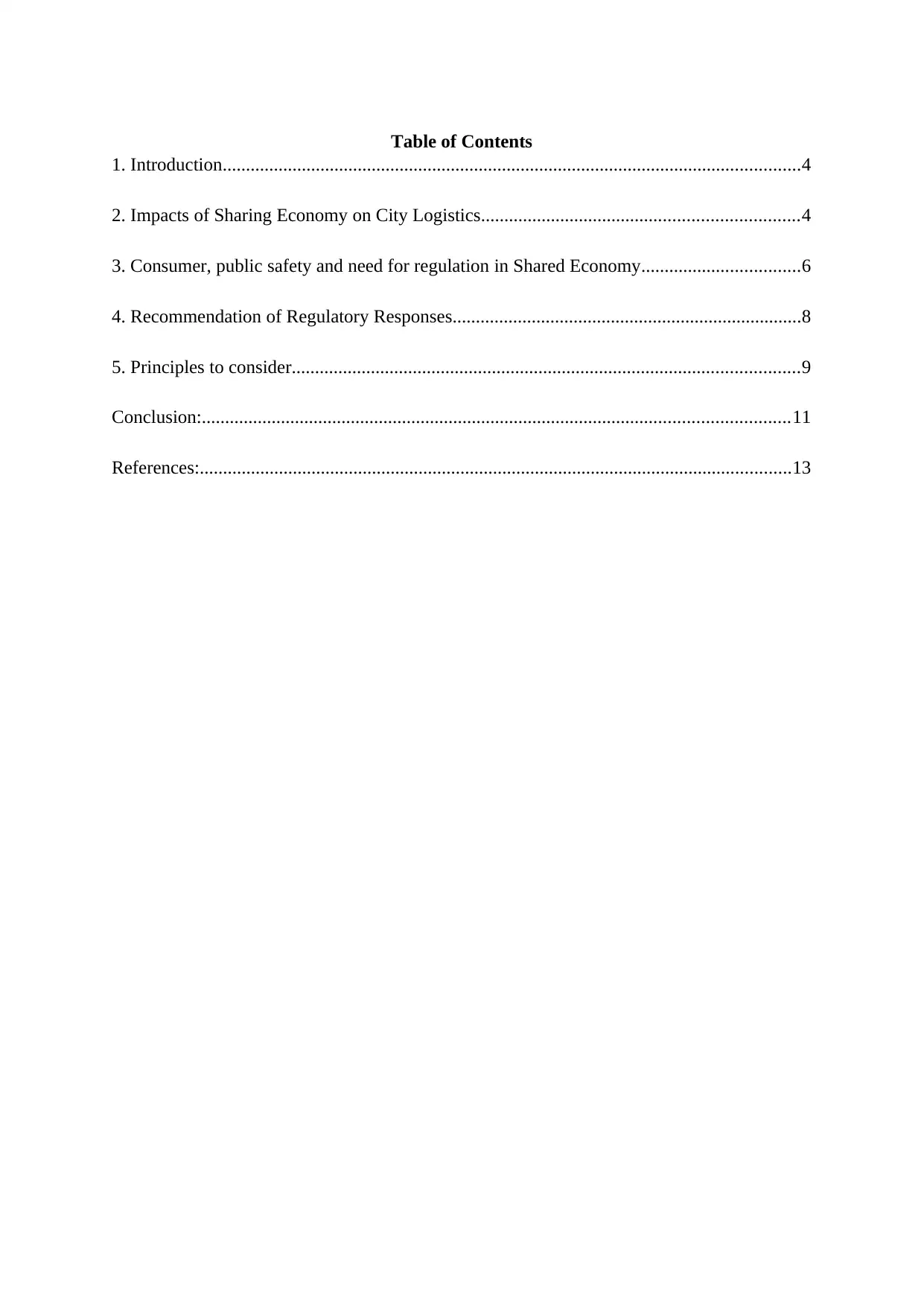
Table of Contents
1. Introduction............................................................................................................................4
2. Impacts of Sharing Economy on City Logistics....................................................................4
3. Consumer, public safety and need for regulation in Shared Economy..................................6
4. Recommendation of Regulatory Responses...........................................................................8
5. Principles to consider.............................................................................................................9
Conclusion:..............................................................................................................................11
References:...............................................................................................................................13
1. Introduction............................................................................................................................4
2. Impacts of Sharing Economy on City Logistics....................................................................4
3. Consumer, public safety and need for regulation in Shared Economy..................................6
4. Recommendation of Regulatory Responses...........................................................................8
5. Principles to consider.............................................................................................................9
Conclusion:..............................................................................................................................11
References:...............................................................................................................................13
⊘ This is a preview!⊘
Do you want full access?
Subscribe today to unlock all pages.

Trusted by 1+ million students worldwide
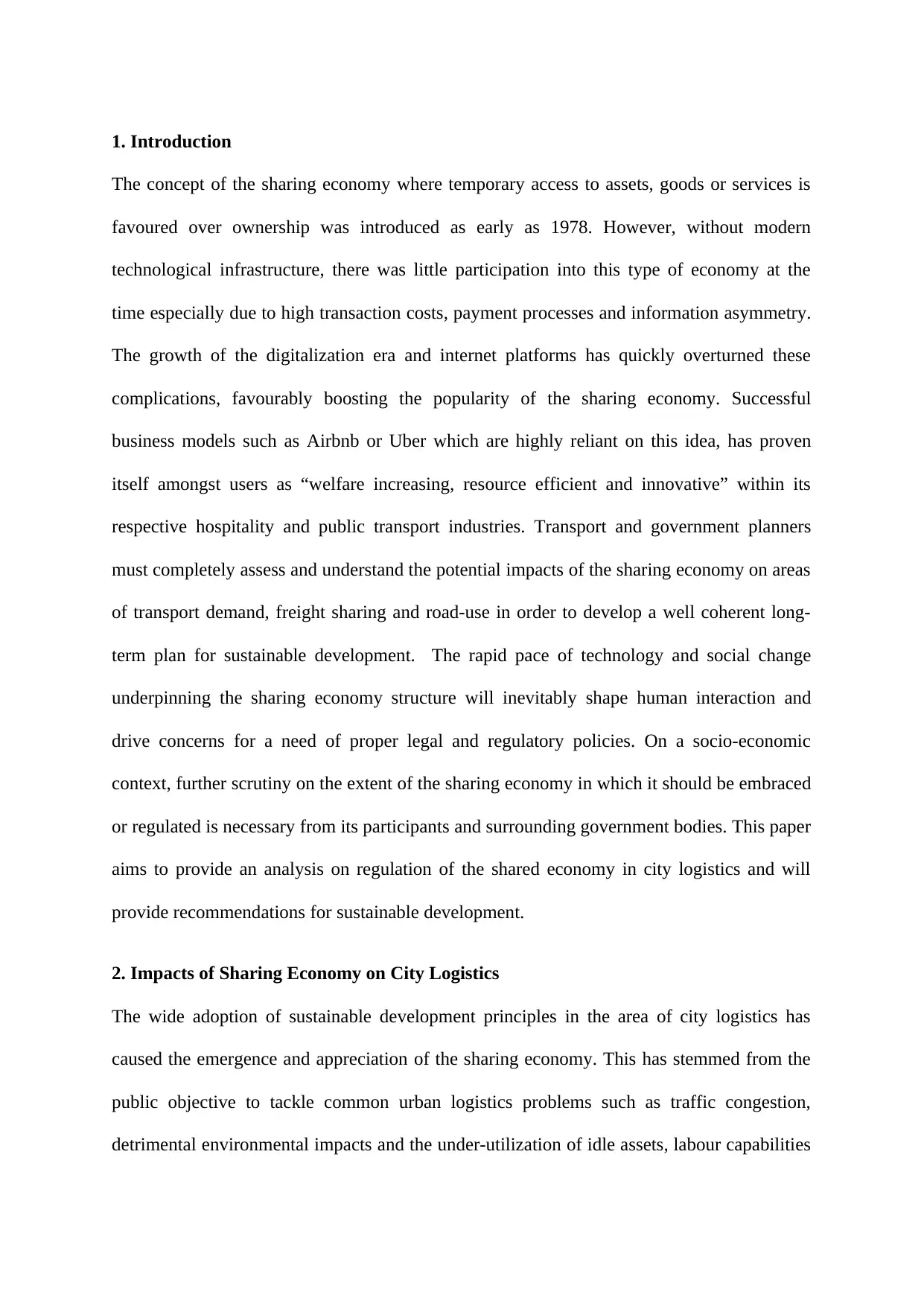
1. Introduction
The concept of the sharing economy where temporary access to assets, goods or services is
favoured over ownership was introduced as early as 1978. However, without modern
technological infrastructure, there was little participation into this type of economy at the
time especially due to high transaction costs, payment processes and information asymmetry.
The growth of the digitalization era and internet platforms has quickly overturned these
complications, favourably boosting the popularity of the sharing economy. Successful
business models such as Airbnb or Uber which are highly reliant on this idea, has proven
itself amongst users as “welfare increasing, resource efficient and innovative” within its
respective hospitality and public transport industries. Transport and government planners
must completely assess and understand the potential impacts of the sharing economy on areas
of transport demand, freight sharing and road-use in order to develop a well coherent long-
term plan for sustainable development. The rapid pace of technology and social change
underpinning the sharing economy structure will inevitably shape human interaction and
drive concerns for a need of proper legal and regulatory policies. On a socio-economic
context, further scrutiny on the extent of the sharing economy in which it should be embraced
or regulated is necessary from its participants and surrounding government bodies. This paper
aims to provide an analysis on regulation of the shared economy in city logistics and will
provide recommendations for sustainable development.
2. Impacts of Sharing Economy on City Logistics
The wide adoption of sustainable development principles in the area of city logistics has
caused the emergence and appreciation of the sharing economy. This has stemmed from the
public objective to tackle common urban logistics problems such as traffic congestion,
detrimental environmental impacts and the under-utilization of idle assets, labour capabilities
The concept of the sharing economy where temporary access to assets, goods or services is
favoured over ownership was introduced as early as 1978. However, without modern
technological infrastructure, there was little participation into this type of economy at the
time especially due to high transaction costs, payment processes and information asymmetry.
The growth of the digitalization era and internet platforms has quickly overturned these
complications, favourably boosting the popularity of the sharing economy. Successful
business models such as Airbnb or Uber which are highly reliant on this idea, has proven
itself amongst users as “welfare increasing, resource efficient and innovative” within its
respective hospitality and public transport industries. Transport and government planners
must completely assess and understand the potential impacts of the sharing economy on areas
of transport demand, freight sharing and road-use in order to develop a well coherent long-
term plan for sustainable development. The rapid pace of technology and social change
underpinning the sharing economy structure will inevitably shape human interaction and
drive concerns for a need of proper legal and regulatory policies. On a socio-economic
context, further scrutiny on the extent of the sharing economy in which it should be embraced
or regulated is necessary from its participants and surrounding government bodies. This paper
aims to provide an analysis on regulation of the shared economy in city logistics and will
provide recommendations for sustainable development.
2. Impacts of Sharing Economy on City Logistics
The wide adoption of sustainable development principles in the area of city logistics has
caused the emergence and appreciation of the sharing economy. This has stemmed from the
public objective to tackle common urban logistics problems such as traffic congestion,
detrimental environmental impacts and the under-utilization of idle assets, labour capabilities
Paraphrase This Document
Need a fresh take? Get an instant paraphrase of this document with our AI Paraphraser
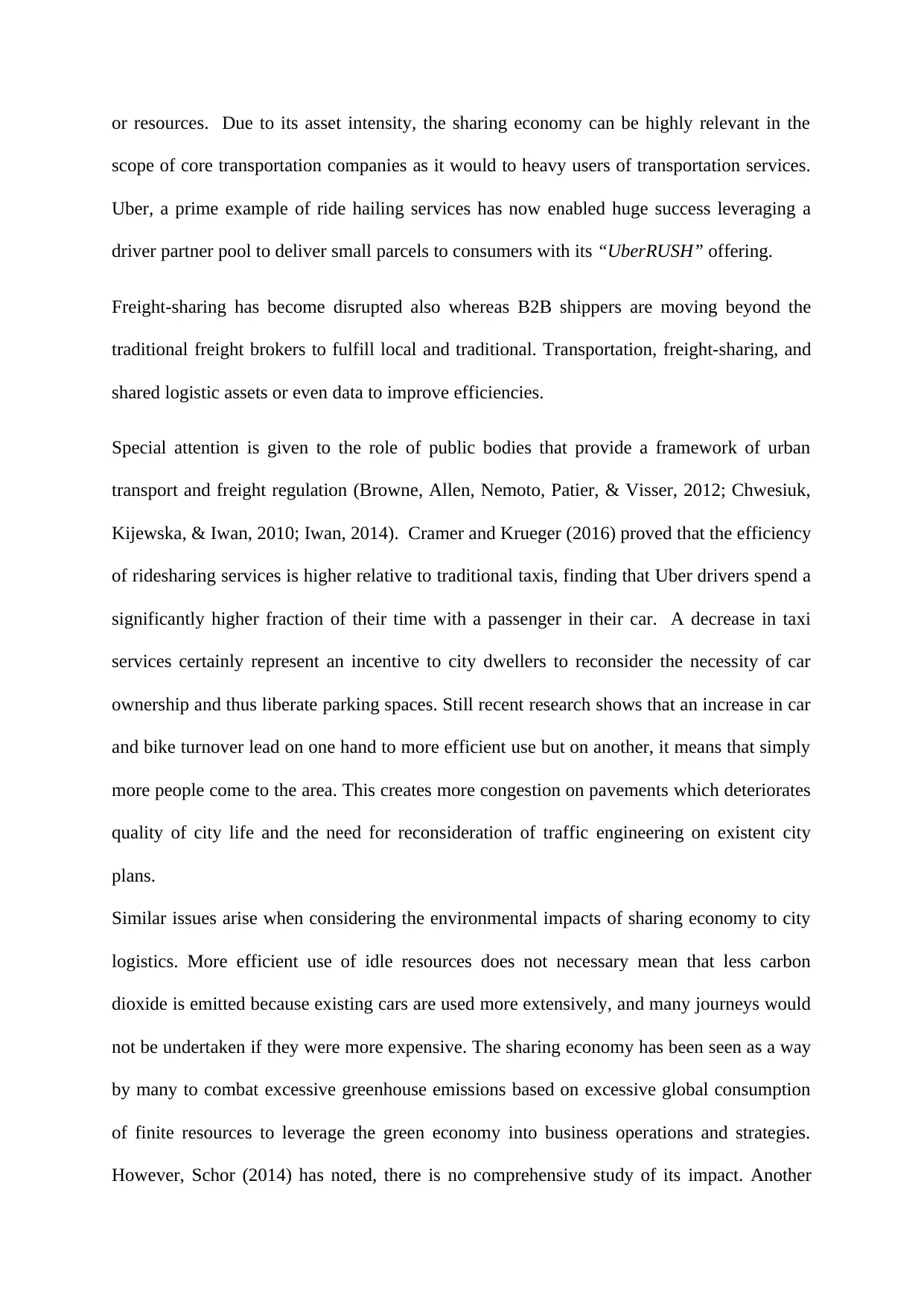
or resources. Due to its asset intensity, the sharing economy can be highly relevant in the
scope of core transportation companies as it would to heavy users of transportation services.
Uber, a prime example of ride hailing services has now enabled huge success leveraging a
driver partner pool to deliver small parcels to consumers with its “UberRUSH” offering.
Freight-sharing has become disrupted also whereas B2B shippers are moving beyond the
traditional freight brokers to fulfill local and traditional. Transportation, freight-sharing, and
shared logistic assets or even data to improve efficiencies.
Special attention is given to the role of public bodies that provide a framework of urban
transport and freight regulation (Browne, Allen, Nemoto, Patier, & Visser, 2012; Chwesiuk,
Kijewska, & Iwan, 2010; Iwan, 2014). Cramer and Krueger (2016) proved that the efficiency
of ridesharing services is higher relative to traditional taxis, finding that Uber drivers spend a
significantly higher fraction of their time with a passenger in their car. A decrease in taxi
services certainly represent an incentive to city dwellers to reconsider the necessity of car
ownership and thus liberate parking spaces. Still recent research shows that an increase in car
and bike turnover lead on one hand to more efficient use but on another, it means that simply
more people come to the area. This creates more congestion on pavements which deteriorates
quality of city life and the need for reconsideration of traffic engineering on existent city
plans.
Similar issues arise when considering the environmental impacts of sharing economy to city
logistics. More efficient use of idle resources does not necessary mean that less carbon
dioxide is emitted because existing cars are used more extensively, and many journeys would
not be undertaken if they were more expensive. The sharing economy has been seen as a way
by many to combat excessive greenhouse emissions based on excessive global consumption
of finite resources to leverage the green economy into business operations and strategies.
However, Schor (2014) has noted, there is no comprehensive study of its impact. Another
scope of core transportation companies as it would to heavy users of transportation services.
Uber, a prime example of ride hailing services has now enabled huge success leveraging a
driver partner pool to deliver small parcels to consumers with its “UberRUSH” offering.
Freight-sharing has become disrupted also whereas B2B shippers are moving beyond the
traditional freight brokers to fulfill local and traditional. Transportation, freight-sharing, and
shared logistic assets or even data to improve efficiencies.
Special attention is given to the role of public bodies that provide a framework of urban
transport and freight regulation (Browne, Allen, Nemoto, Patier, & Visser, 2012; Chwesiuk,
Kijewska, & Iwan, 2010; Iwan, 2014). Cramer and Krueger (2016) proved that the efficiency
of ridesharing services is higher relative to traditional taxis, finding that Uber drivers spend a
significantly higher fraction of their time with a passenger in their car. A decrease in taxi
services certainly represent an incentive to city dwellers to reconsider the necessity of car
ownership and thus liberate parking spaces. Still recent research shows that an increase in car
and bike turnover lead on one hand to more efficient use but on another, it means that simply
more people come to the area. This creates more congestion on pavements which deteriorates
quality of city life and the need for reconsideration of traffic engineering on existent city
plans.
Similar issues arise when considering the environmental impacts of sharing economy to city
logistics. More efficient use of idle resources does not necessary mean that less carbon
dioxide is emitted because existing cars are used more extensively, and many journeys would
not be undertaken if they were more expensive. The sharing economy has been seen as a way
by many to combat excessive greenhouse emissions based on excessive global consumption
of finite resources to leverage the green economy into business operations and strategies.
However, Schor (2014) has noted, there is no comprehensive study of its impact. Another
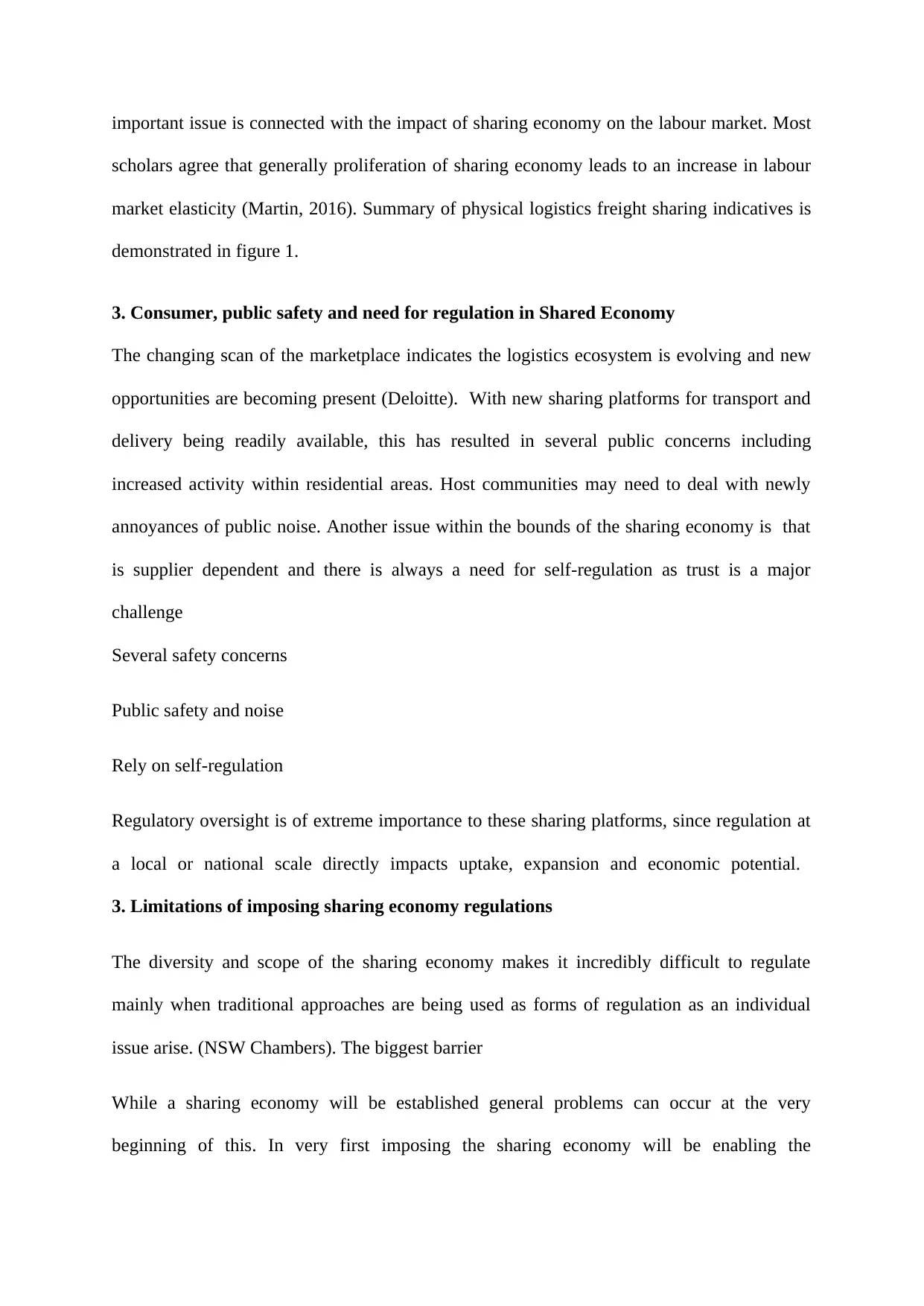
important issue is connected with the impact of sharing economy on the labour market. Most
scholars agree that generally proliferation of sharing economy leads to an increase in labour
market elasticity (Martin, 2016). Summary of physical logistics freight sharing indicatives is
demonstrated in figure 1.
3. Consumer, public safety and need for regulation in Shared Economy
The changing scan of the marketplace indicates the logistics ecosystem is evolving and new
opportunities are becoming present (Deloitte). With new sharing platforms for transport and
delivery being readily available, this has resulted in several public concerns including
increased activity within residential areas. Host communities may need to deal with newly
annoyances of public noise. Another issue within the bounds of the sharing economy is that
is supplier dependent and there is always a need for self-regulation as trust is a major
challenge
Several safety concerns
Public safety and noise
Rely on self-regulation
Regulatory oversight is of extreme importance to these sharing platforms, since regulation at
a local or national scale directly impacts uptake, expansion and economic potential.
3. Limitations of imposing sharing economy regulations
The diversity and scope of the sharing economy makes it incredibly difficult to regulate
mainly when traditional approaches are being used as forms of regulation as an individual
issue arise. (NSW Chambers). The biggest barrier
While a sharing economy will be established general problems can occur at the very
beginning of this. In very first imposing the sharing economy will be enabling the
scholars agree that generally proliferation of sharing economy leads to an increase in labour
market elasticity (Martin, 2016). Summary of physical logistics freight sharing indicatives is
demonstrated in figure 1.
3. Consumer, public safety and need for regulation in Shared Economy
The changing scan of the marketplace indicates the logistics ecosystem is evolving and new
opportunities are becoming present (Deloitte). With new sharing platforms for transport and
delivery being readily available, this has resulted in several public concerns including
increased activity within residential areas. Host communities may need to deal with newly
annoyances of public noise. Another issue within the bounds of the sharing economy is that
is supplier dependent and there is always a need for self-regulation as trust is a major
challenge
Several safety concerns
Public safety and noise
Rely on self-regulation
Regulatory oversight is of extreme importance to these sharing platforms, since regulation at
a local or national scale directly impacts uptake, expansion and economic potential.
3. Limitations of imposing sharing economy regulations
The diversity and scope of the sharing economy makes it incredibly difficult to regulate
mainly when traditional approaches are being used as forms of regulation as an individual
issue arise. (NSW Chambers). The biggest barrier
While a sharing economy will be established general problems can occur at the very
beginning of this. In very first imposing the sharing economy will be enabling the
⊘ This is a preview!⊘
Do you want full access?
Subscribe today to unlock all pages.

Trusted by 1+ million students worldwide
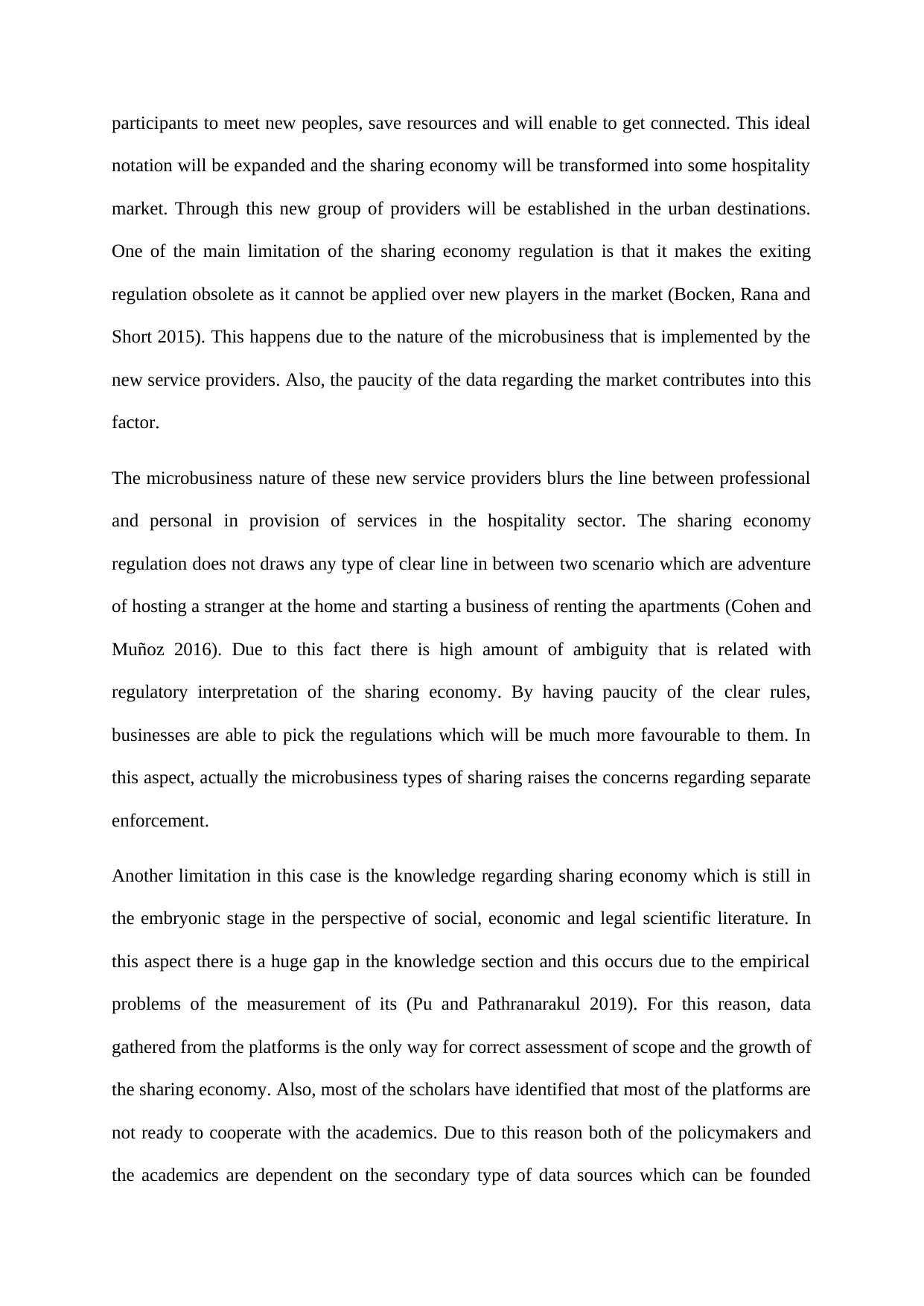
participants to meet new peoples, save resources and will enable to get connected. This ideal
notation will be expanded and the sharing economy will be transformed into some hospitality
market. Through this new group of providers will be established in the urban destinations.
One of the main limitation of the sharing economy regulation is that it makes the exiting
regulation obsolete as it cannot be applied over new players in the market (Bocken, Rana and
Short 2015). This happens due to the nature of the microbusiness that is implemented by the
new service providers. Also, the paucity of the data regarding the market contributes into this
factor.
The microbusiness nature of these new service providers blurs the line between professional
and personal in provision of services in the hospitality sector. The sharing economy
regulation does not draws any type of clear line in between two scenario which are adventure
of hosting a stranger at the home and starting a business of renting the apartments (Cohen and
Muñoz 2016). Due to this fact there is high amount of ambiguity that is related with
regulatory interpretation of the sharing economy. By having paucity of the clear rules,
businesses are able to pick the regulations which will be much more favourable to them. In
this aspect, actually the microbusiness types of sharing raises the concerns regarding separate
enforcement.
Another limitation in this case is the knowledge regarding sharing economy which is still in
the embryonic stage in the perspective of social, economic and legal scientific literature. In
this aspect there is a huge gap in the knowledge section and this occurs due to the empirical
problems of the measurement of its (Pu and Pathranarakul 2019). For this reason, data
gathered from the platforms is the only way for correct assessment of scope and the growth of
the sharing economy. Also, most of the scholars have identified that most of the platforms are
not ready to cooperate with the academics. Due to this reason both of the policymakers and
the academics are dependent on the secondary type of data sources which can be founded
notation will be expanded and the sharing economy will be transformed into some hospitality
market. Through this new group of providers will be established in the urban destinations.
One of the main limitation of the sharing economy regulation is that it makes the exiting
regulation obsolete as it cannot be applied over new players in the market (Bocken, Rana and
Short 2015). This happens due to the nature of the microbusiness that is implemented by the
new service providers. Also, the paucity of the data regarding the market contributes into this
factor.
The microbusiness nature of these new service providers blurs the line between professional
and personal in provision of services in the hospitality sector. The sharing economy
regulation does not draws any type of clear line in between two scenario which are adventure
of hosting a stranger at the home and starting a business of renting the apartments (Cohen and
Muñoz 2016). Due to this fact there is high amount of ambiguity that is related with
regulatory interpretation of the sharing economy. By having paucity of the clear rules,
businesses are able to pick the regulations which will be much more favourable to them. In
this aspect, actually the microbusiness types of sharing raises the concerns regarding separate
enforcement.
Another limitation in this case is the knowledge regarding sharing economy which is still in
the embryonic stage in the perspective of social, economic and legal scientific literature. In
this aspect there is a huge gap in the knowledge section and this occurs due to the empirical
problems of the measurement of its (Pu and Pathranarakul 2019). For this reason, data
gathered from the platforms is the only way for correct assessment of scope and the growth of
the sharing economy. Also, most of the scholars have identified that most of the platforms are
not ready to cooperate with the academics. Due to this reason both of the policymakers and
the academics are dependent on the secondary type of data sources which can be founded
Paraphrase This Document
Need a fresh take? Get an instant paraphrase of this document with our AI Paraphraser
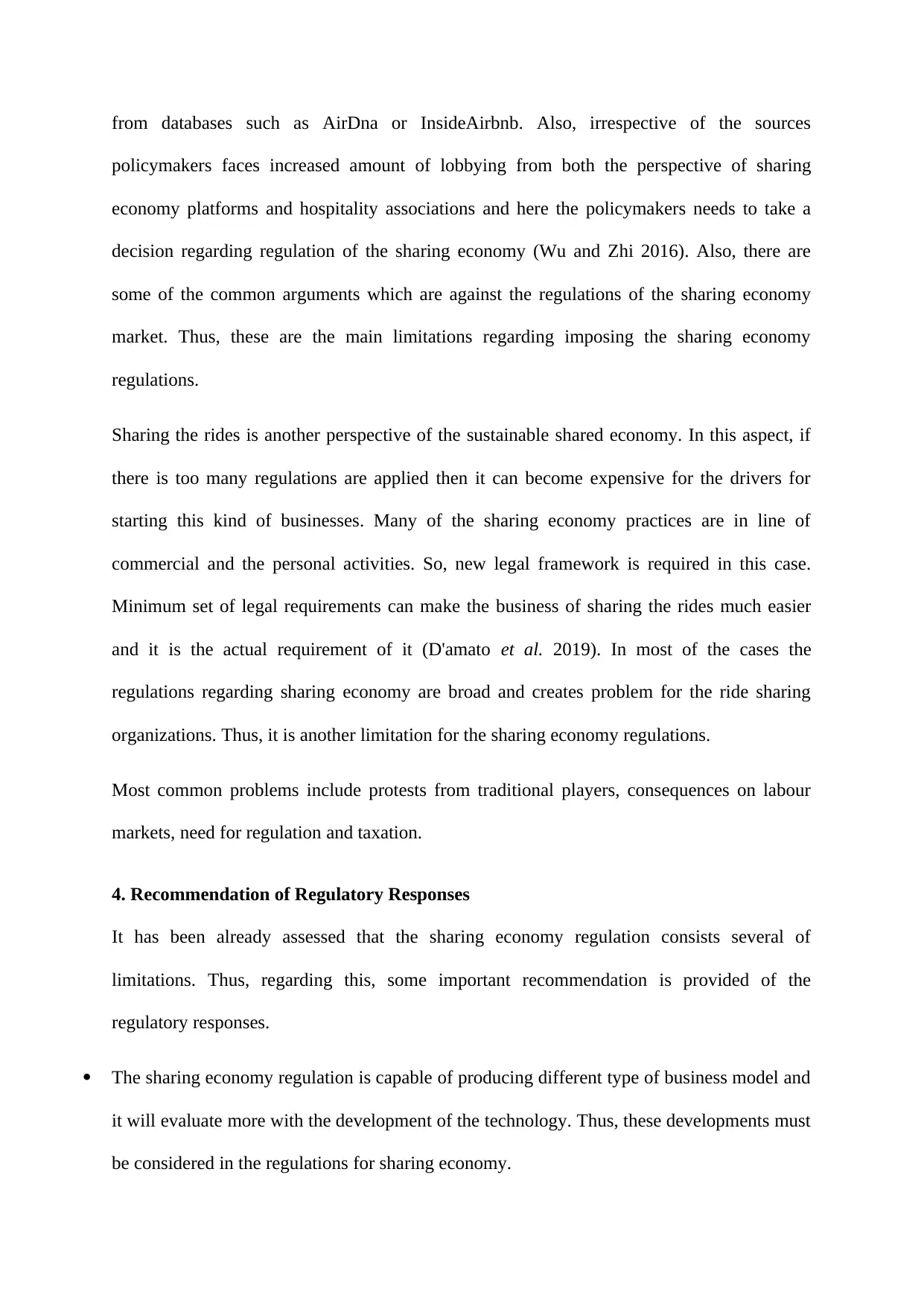
from databases such as AirDna or InsideAirbnb. Also, irrespective of the sources
policymakers faces increased amount of lobbying from both the perspective of sharing
economy platforms and hospitality associations and here the policymakers needs to take a
decision regarding regulation of the sharing economy (Wu and Zhi 2016). Also, there are
some of the common arguments which are against the regulations of the sharing economy
market. Thus, these are the main limitations regarding imposing the sharing economy
regulations.
Sharing the rides is another perspective of the sustainable shared economy. In this aspect, if
there is too many regulations are applied then it can become expensive for the drivers for
starting this kind of businesses. Many of the sharing economy practices are in line of
commercial and the personal activities. So, new legal framework is required in this case.
Minimum set of legal requirements can make the business of sharing the rides much easier
and it is the actual requirement of it (D'amato et al. 2019). In most of the cases the
regulations regarding sharing economy are broad and creates problem for the ride sharing
organizations. Thus, it is another limitation for the sharing economy regulations.
Most common problems include protests from traditional players, consequences on labour
markets, need for regulation and taxation.
4. Recommendation of Regulatory Responses
It has been already assessed that the sharing economy regulation consists several of
limitations. Thus, regarding this, some important recommendation is provided of the
regulatory responses.
The sharing economy regulation is capable of producing different type of business model and
it will evaluate more with the development of the technology. Thus, these developments must
be considered in the regulations for sharing economy.
policymakers faces increased amount of lobbying from both the perspective of sharing
economy platforms and hospitality associations and here the policymakers needs to take a
decision regarding regulation of the sharing economy (Wu and Zhi 2016). Also, there are
some of the common arguments which are against the regulations of the sharing economy
market. Thus, these are the main limitations regarding imposing the sharing economy
regulations.
Sharing the rides is another perspective of the sustainable shared economy. In this aspect, if
there is too many regulations are applied then it can become expensive for the drivers for
starting this kind of businesses. Many of the sharing economy practices are in line of
commercial and the personal activities. So, new legal framework is required in this case.
Minimum set of legal requirements can make the business of sharing the rides much easier
and it is the actual requirement of it (D'amato et al. 2019). In most of the cases the
regulations regarding sharing economy are broad and creates problem for the ride sharing
organizations. Thus, it is another limitation for the sharing economy regulations.
Most common problems include protests from traditional players, consequences on labour
markets, need for regulation and taxation.
4. Recommendation of Regulatory Responses
It has been already assessed that the sharing economy regulation consists several of
limitations. Thus, regarding this, some important recommendation is provided of the
regulatory responses.
The sharing economy regulation is capable of producing different type of business model and
it will evaluate more with the development of the technology. Thus, these developments must
be considered in the regulations for sharing economy.
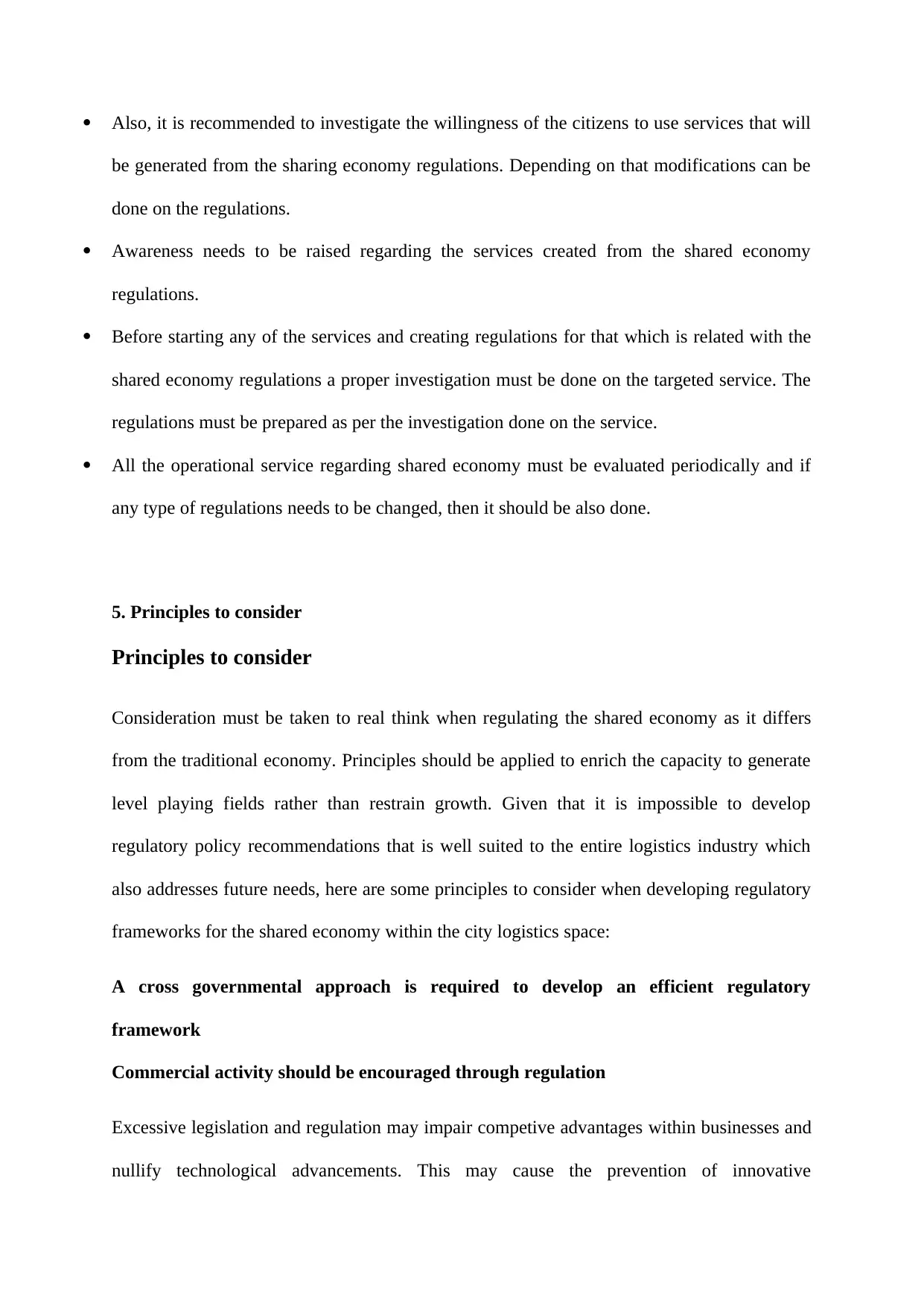
Also, it is recommended to investigate the willingness of the citizens to use services that will
be generated from the sharing economy regulations. Depending on that modifications can be
done on the regulations.
Awareness needs to be raised regarding the services created from the shared economy
regulations.
Before starting any of the services and creating regulations for that which is related with the
shared economy regulations a proper investigation must be done on the targeted service. The
regulations must be prepared as per the investigation done on the service.
All the operational service regarding shared economy must be evaluated periodically and if
any type of regulations needs to be changed, then it should be also done.
5. Principles to consider
Principles to consider
Consideration must be taken to real think when regulating the shared economy as it differs
from the traditional economy. Principles should be applied to enrich the capacity to generate
level playing fields rather than restrain growth. Given that it is impossible to develop
regulatory policy recommendations that is well suited to the entire logistics industry which
also addresses future needs, here are some principles to consider when developing regulatory
frameworks for the shared economy within the city logistics space:
A cross governmental approach is required to develop an efficient regulatory
framework
Commercial activity should be encouraged through regulation
Excessive legislation and regulation may impair competive advantages within businesses and
nullify technological advancements. This may cause the prevention of innovative
be generated from the sharing economy regulations. Depending on that modifications can be
done on the regulations.
Awareness needs to be raised regarding the services created from the shared economy
regulations.
Before starting any of the services and creating regulations for that which is related with the
shared economy regulations a proper investigation must be done on the targeted service. The
regulations must be prepared as per the investigation done on the service.
All the operational service regarding shared economy must be evaluated periodically and if
any type of regulations needs to be changed, then it should be also done.
5. Principles to consider
Principles to consider
Consideration must be taken to real think when regulating the shared economy as it differs
from the traditional economy. Principles should be applied to enrich the capacity to generate
level playing fields rather than restrain growth. Given that it is impossible to develop
regulatory policy recommendations that is well suited to the entire logistics industry which
also addresses future needs, here are some principles to consider when developing regulatory
frameworks for the shared economy within the city logistics space:
A cross governmental approach is required to develop an efficient regulatory
framework
Commercial activity should be encouraged through regulation
Excessive legislation and regulation may impair competive advantages within businesses and
nullify technological advancements. This may cause the prevention of innovative
⊘ This is a preview!⊘
Do you want full access?
Subscribe today to unlock all pages.

Trusted by 1+ million students worldwide
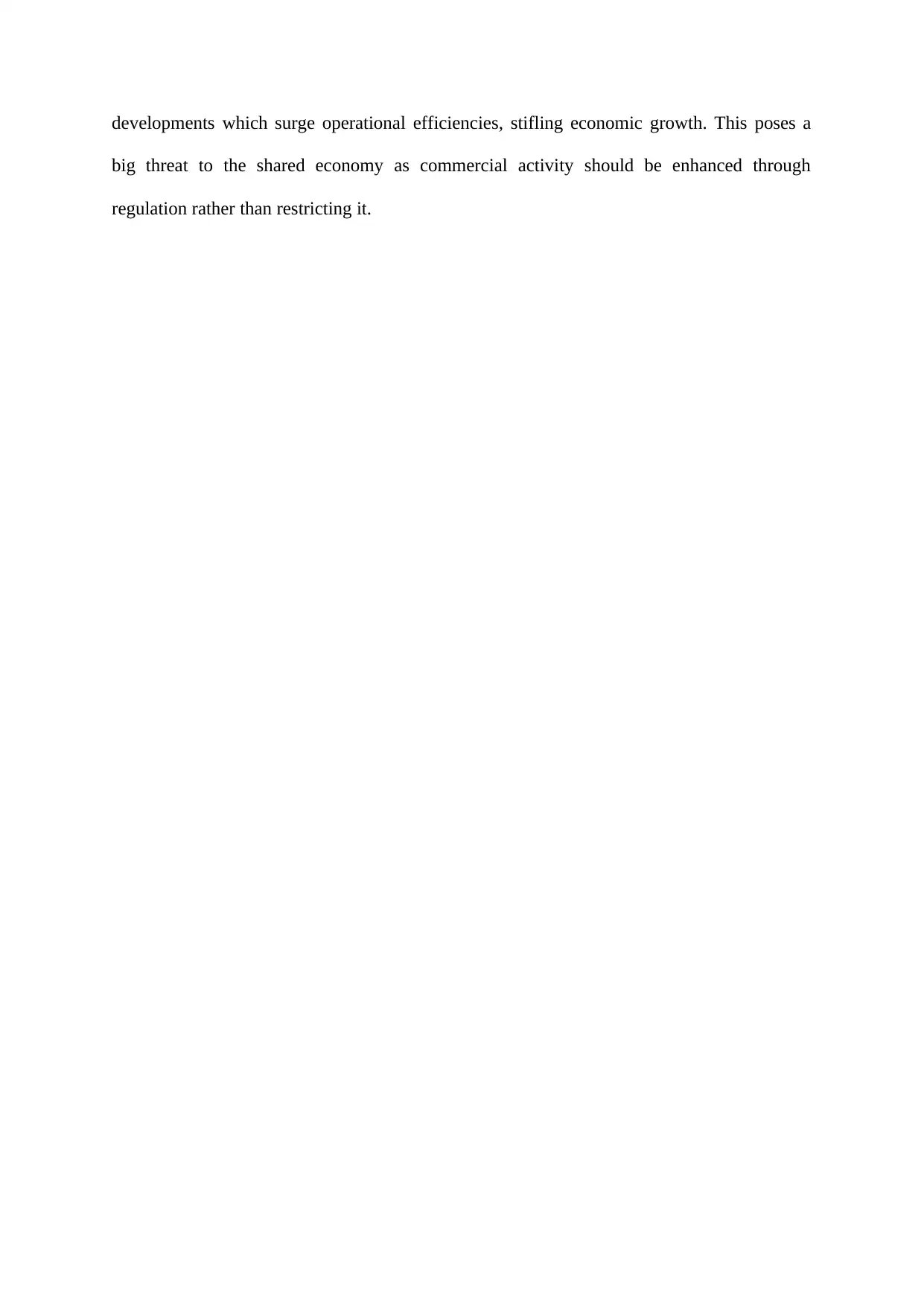
developments which surge operational efficiencies, stifling economic growth. This poses a
big threat to the shared economy as commercial activity should be enhanced through
regulation rather than restricting it.
big threat to the shared economy as commercial activity should be enhanced through
regulation rather than restricting it.
Paraphrase This Document
Need a fresh take? Get an instant paraphrase of this document with our AI Paraphraser
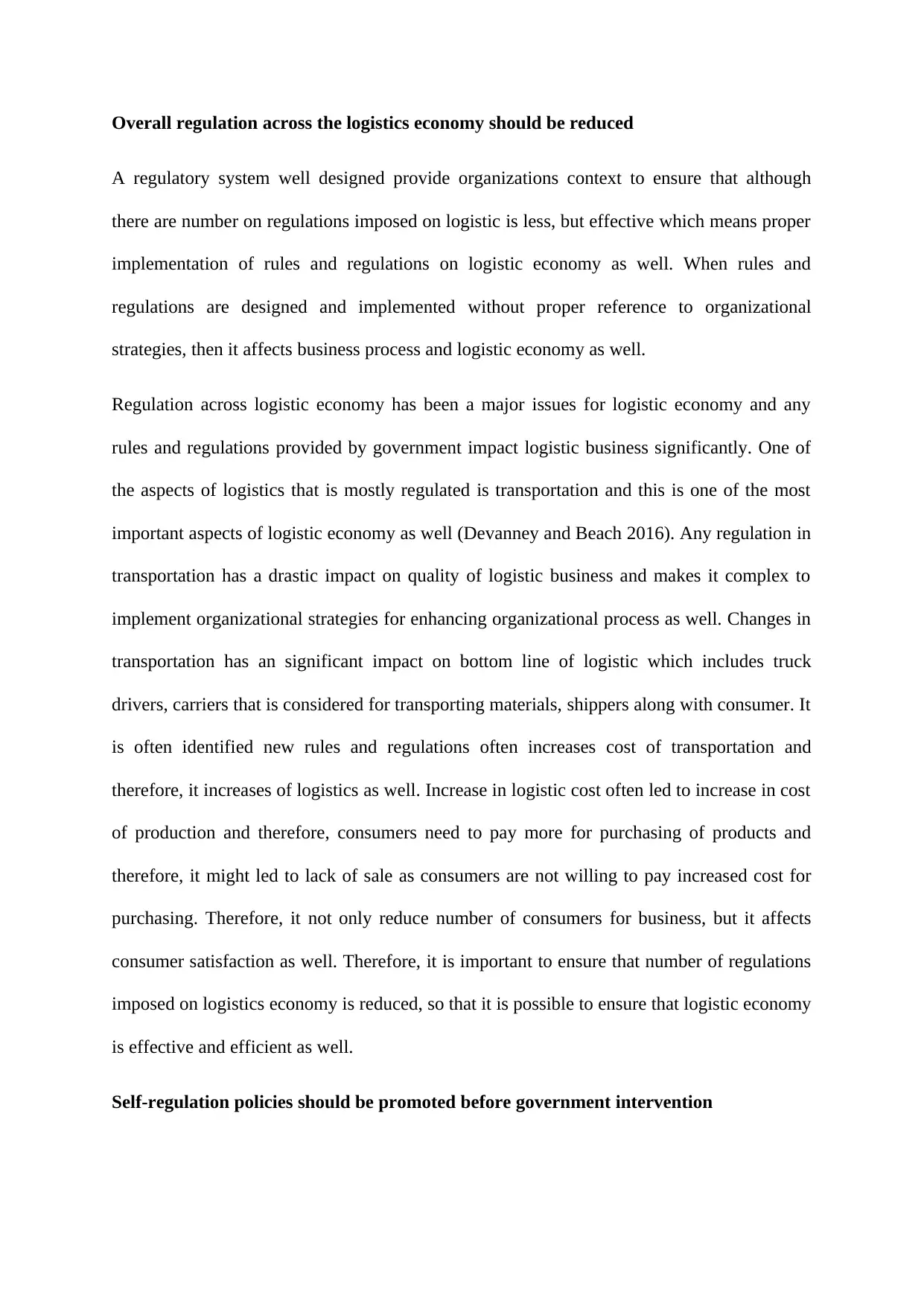
Overall regulation across the logistics economy should be reduced
A regulatory system well designed provide organizations context to ensure that although
there are number on regulations imposed on logistic is less, but effective which means proper
implementation of rules and regulations on logistic economy as well. When rules and
regulations are designed and implemented without proper reference to organizational
strategies, then it affects business process and logistic economy as well.
Regulation across logistic economy has been a major issues for logistic economy and any
rules and regulations provided by government impact logistic business significantly. One of
the aspects of logistics that is mostly regulated is transportation and this is one of the most
important aspects of logistic economy as well (Devanney and Beach 2016). Any regulation in
transportation has a drastic impact on quality of logistic business and makes it complex to
implement organizational strategies for enhancing organizational process as well. Changes in
transportation has an significant impact on bottom line of logistic which includes truck
drivers, carriers that is considered for transporting materials, shippers along with consumer. It
is often identified new rules and regulations often increases cost of transportation and
therefore, it increases of logistics as well. Increase in logistic cost often led to increase in cost
of production and therefore, consumers need to pay more for purchasing of products and
therefore, it might led to lack of sale as consumers are not willing to pay increased cost for
purchasing. Therefore, it not only reduce number of consumers for business, but it affects
consumer satisfaction as well. Therefore, it is important to ensure that number of regulations
imposed on logistics economy is reduced, so that it is possible to ensure that logistic economy
is effective and efficient as well.
Self-regulation policies should be promoted before government intervention
A regulatory system well designed provide organizations context to ensure that although
there are number on regulations imposed on logistic is less, but effective which means proper
implementation of rules and regulations on logistic economy as well. When rules and
regulations are designed and implemented without proper reference to organizational
strategies, then it affects business process and logistic economy as well.
Regulation across logistic economy has been a major issues for logistic economy and any
rules and regulations provided by government impact logistic business significantly. One of
the aspects of logistics that is mostly regulated is transportation and this is one of the most
important aspects of logistic economy as well (Devanney and Beach 2016). Any regulation in
transportation has a drastic impact on quality of logistic business and makes it complex to
implement organizational strategies for enhancing organizational process as well. Changes in
transportation has an significant impact on bottom line of logistic which includes truck
drivers, carriers that is considered for transporting materials, shippers along with consumer. It
is often identified new rules and regulations often increases cost of transportation and
therefore, it increases of logistics as well. Increase in logistic cost often led to increase in cost
of production and therefore, consumers need to pay more for purchasing of products and
therefore, it might led to lack of sale as consumers are not willing to pay increased cost for
purchasing. Therefore, it not only reduce number of consumers for business, but it affects
consumer satisfaction as well. Therefore, it is important to ensure that number of regulations
imposed on logistics economy is reduced, so that it is possible to ensure that logistic economy
is effective and efficient as well.
Self-regulation policies should be promoted before government intervention
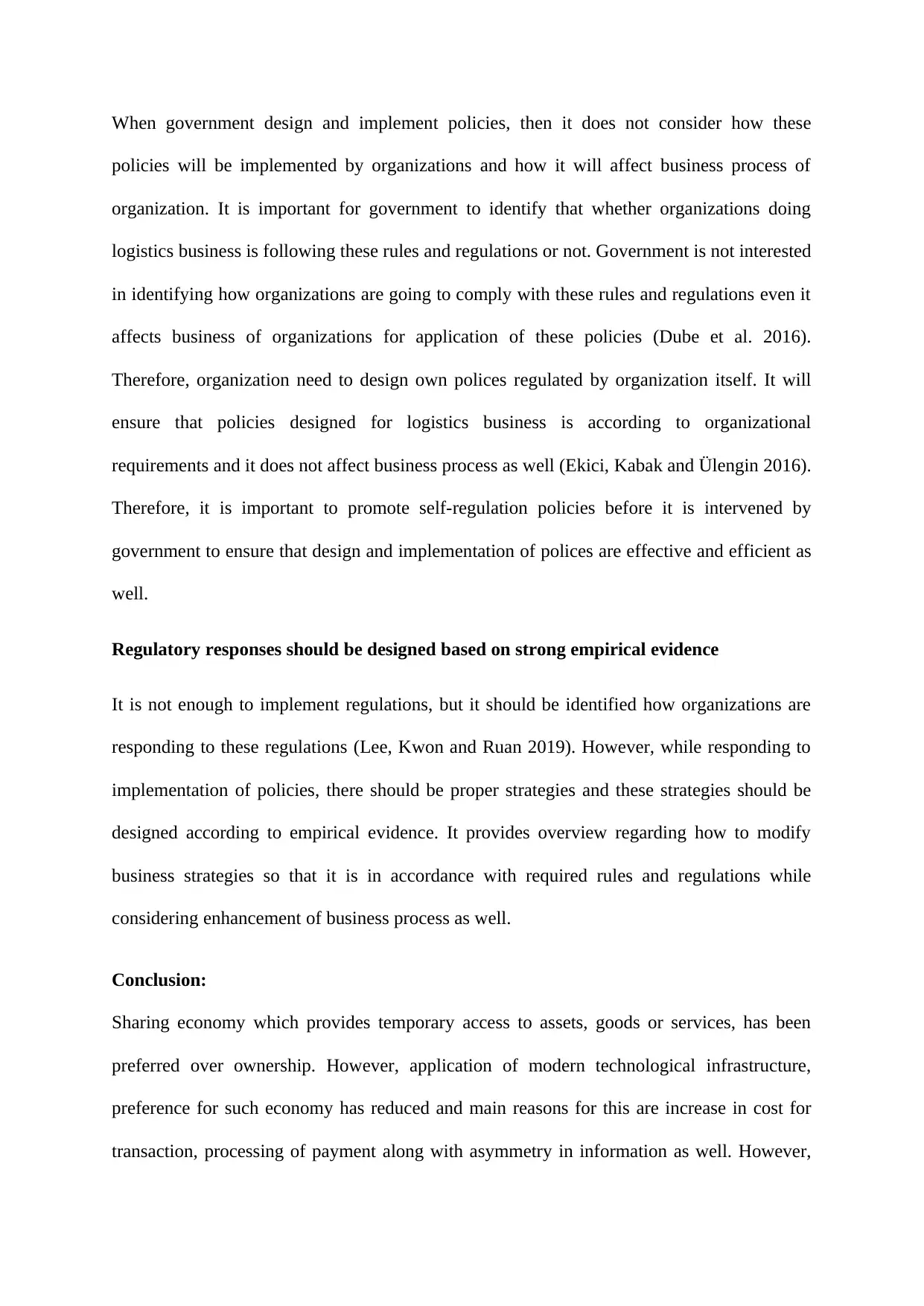
When government design and implement policies, then it does not consider how these
policies will be implemented by organizations and how it will affect business process of
organization. It is important for government to identify that whether organizations doing
logistics business is following these rules and regulations or not. Government is not interested
in identifying how organizations are going to comply with these rules and regulations even it
affects business of organizations for application of these policies (Dube et al. 2016).
Therefore, organization need to design own polices regulated by organization itself. It will
ensure that policies designed for logistics business is according to organizational
requirements and it does not affect business process as well (Ekici, Kabak and Ülengin 2016).
Therefore, it is important to promote self-regulation policies before it is intervened by
government to ensure that design and implementation of polices are effective and efficient as
well.
Regulatory responses should be designed based on strong empirical evidence
It is not enough to implement regulations, but it should be identified how organizations are
responding to these regulations (Lee, Kwon and Ruan 2019). However, while responding to
implementation of policies, there should be proper strategies and these strategies should be
designed according to empirical evidence. It provides overview regarding how to modify
business strategies so that it is in accordance with required rules and regulations while
considering enhancement of business process as well.
Conclusion:
Sharing economy which provides temporary access to assets, goods or services, has been
preferred over ownership. However, application of modern technological infrastructure,
preference for such economy has reduced and main reasons for this are increase in cost for
transaction, processing of payment along with asymmetry in information as well. However,
policies will be implemented by organizations and how it will affect business process of
organization. It is important for government to identify that whether organizations doing
logistics business is following these rules and regulations or not. Government is not interested
in identifying how organizations are going to comply with these rules and regulations even it
affects business of organizations for application of these policies (Dube et al. 2016).
Therefore, organization need to design own polices regulated by organization itself. It will
ensure that policies designed for logistics business is according to organizational
requirements and it does not affect business process as well (Ekici, Kabak and Ülengin 2016).
Therefore, it is important to promote self-regulation policies before it is intervened by
government to ensure that design and implementation of polices are effective and efficient as
well.
Regulatory responses should be designed based on strong empirical evidence
It is not enough to implement regulations, but it should be identified how organizations are
responding to these regulations (Lee, Kwon and Ruan 2019). However, while responding to
implementation of policies, there should be proper strategies and these strategies should be
designed according to empirical evidence. It provides overview regarding how to modify
business strategies so that it is in accordance with required rules and regulations while
considering enhancement of business process as well.
Conclusion:
Sharing economy which provides temporary access to assets, goods or services, has been
preferred over ownership. However, application of modern technological infrastructure,
preference for such economy has reduced and main reasons for this are increase in cost for
transaction, processing of payment along with asymmetry in information as well. However,
⊘ This is a preview!⊘
Do you want full access?
Subscribe today to unlock all pages.

Trusted by 1+ million students worldwide
1 out of 14
Related Documents
Your All-in-One AI-Powered Toolkit for Academic Success.
+13062052269
info@desklib.com
Available 24*7 on WhatsApp / Email
![[object Object]](/_next/static/media/star-bottom.7253800d.svg)
Unlock your academic potential
Copyright © 2020–2026 A2Z Services. All Rights Reserved. Developed and managed by ZUCOL.




